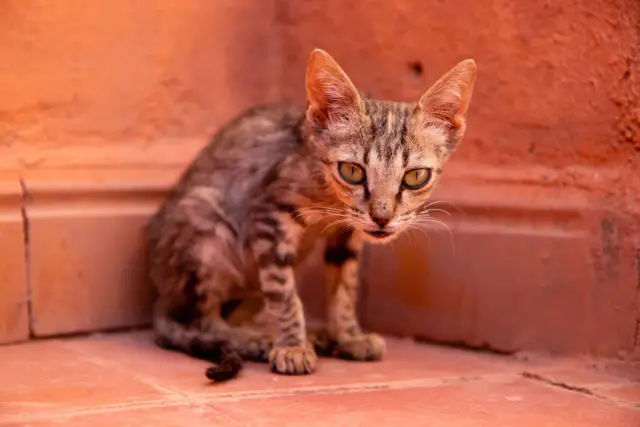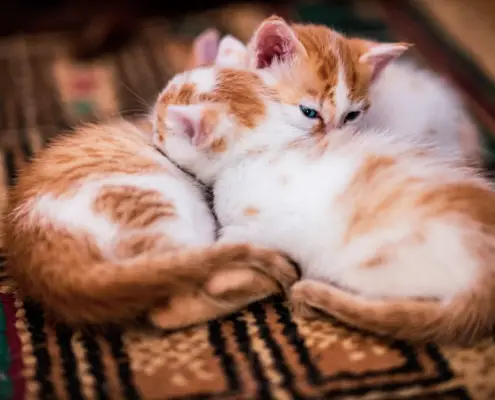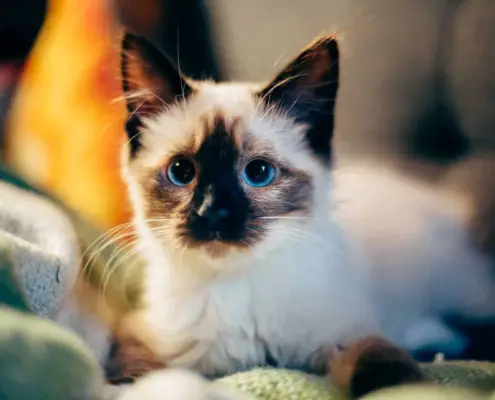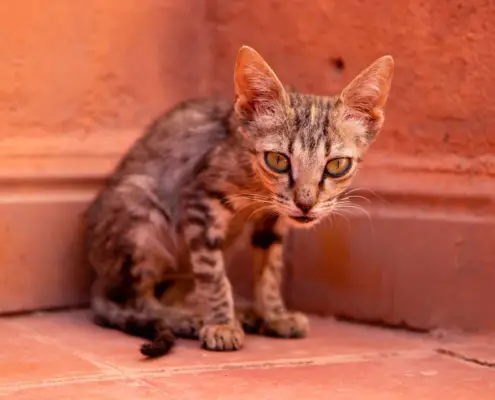
Malnutrition in cats refers to a condition where cats are not receiving the proper nutrients required for optimal health. It occurs when their diet lacks essential nutrients or when they are unable to absorb these nutrients effectively. Malnutrition can affect cats of all ages, from kittens to senior cats, and it can have severe consequences on their overall well-being.
Cats are obligate carnivores, which means they require a diet rich in animal-based proteins and fats. Unlike humans and some other animals, cats cannot produce certain essential nutrients on their own. Therefore, it is crucial to provide them with a well-balanced diet that meets their nutritional needs.
The importance of a balanced diet for cats
A balanced diet plays a vital role in maintaining the health and longevity of cats. It provides them with the necessary nutrients to support their growth, development, and overall bodily functions. A lack of proper nutrition can lead to various health issues and compromise their immune system, making them more susceptible to infections and diseases.
A balanced diet for cats typically consists of high-quality animal proteins, essential fatty acids, vitamins, and minerals. Proteins are especially important for cats as they require a sufficient amount of amino acids, which are the building blocks of proteins. Without an adequate protein intake, cats may experience muscle wasting and weakened immune function.
Signs and symptoms of malnutrition in cats
Recognizing the signs and symptoms of malnutrition in cats is crucial for early intervention and prevention of further complications. Some common signs to look out for include:
- Weight loss: Cats that are not receiving enough nutrients may experience significant weight loss.
- Dull coat and skin issues: Malnourished cats often have dry, brittle fur and flaky skin.
- Lethargy and weakness: Cats lacking proper nutrition may become lethargic, weak, and have a decreased energy level.
- Poor growth in kittens: Malnourished kittens may have stunted growth and fail to reach their developmental milestones.
- Digestive problems: Cats with malnutrition may experience diarrhea, vomiting, or constipation.
If you notice any of these signs in your cat, it is essential to consult with a veterinarian for a proper diagnosis and treatment plan.
Common causes of malnutrition in cats
There are several factors that can contribute to malnutrition in cats. Some common causes include:
- Poor diet: Feeding cats an unbalanced or inadequate diet lacking essential nutrients can lead to malnutrition.
- Inadequate food intake: Cats may not consume enough food due to various reasons such as dental issues, stress, or loss of appetite.
- Medical conditions: Certain medical conditions, such as gastrointestinal disorders or malabsorption issues, can interfere with nutrient absorption and result in malnutrition.
- Neglect or abuse: Cats that have been neglected or subjected to abuse may not receive adequate nutrition, leading to malnutrition.
- Age-related issues: Senior cats may experience a decline in appetite or have difficulty chewing, which can contribute to malnutrition.
Understanding the underlying cause of malnutrition is crucial for developing an appropriate treatment plan and preventing further complications.
Health risks and complications associated with malnutrition in cats
Malnutrition can have significant health risks and complications for cats. Some of these include:
- Weakened immune system: Malnourished cats have a weakened immune system, making them more susceptible to infections and diseases.
- Muscle wasting: Cats lacking proper nutrition may experience muscle wasting, leading to weakness and decreased mobility.
- Organ dysfunction: Malnutrition can affect the proper functioning of vital organs, such as the liver and kidneys, leading to severe health issues.
- Poor wound healing: Cats with malnutrition may have impaired wound healing, making them more prone to infections and delayed recovery.
- Developmental abnormalities: Kittens that experience malnutrition during their crucial growth stages may suffer from developmental abnormalities and lifelong health issues.
It is essential to address malnutrition promptly to prevent these health risks and complications.
How to prevent malnutrition in cats
Preventing malnutrition in cats involves providing them with a well-balanced diet and ensuring they receive adequate nutrition. Here are some important steps to prevent malnutrition:
- Choose high-quality cat food: Opt for cat food that is specifically formulated to meet the nutritional needs of cats. Look for products that contain a good balance of animal-based proteins, fats, vitamins, and minerals.
- Follow feeding guidelines: Follow the recommended feeding guidelines provided by the cat food manufacturer. These guidelines take into account factors such as the cat’s age, weight, and activity level.
- Avoid excessive treats: While treats can be a part of a cat’s diet, it is crucial not to overdo it. Excessive treats can lead to imbalances in their overall nutrition.
- Regular veterinary check-ups: Schedule regular veterinary check-ups to monitor your cat’s overall health and nutritional status. A veterinarian can provide guidance on proper nutrition and detect any early signs of malnutrition.
- Cater to individual needs: Some cats may have specific dietary requirements or medical conditions that require special diets. Consult with your veterinarian to determine the best approach for your cat’s unique needs.
By following these preventive measures, you can ensure your cat receives the necessary nutrition to thrive and minimize the risk of malnutrition.
Recommended diet and nutrition for cats
A well-rounded diet is essential for cats to maintain optimal health. Here are some key elements of a recommended diet for cats:
- Animal-based proteins: Cats require high-quality animal proteins as the primary source of amino acids. Look for cat foods that contain real meat as the main ingredient.
- Essential fatty acids: Omega-3 and omega-6 fatty acids are crucial for maintaining healthy skin, coat, and immune function. These can be found in fish oils or certain plant-based oils.
- Vitamins and minerals: Cats require a variety of vitamins and minerals for proper bodily functions. A balanced cat food should provide these essential nutrients in appropriate amounts.
- Hydration: Cats need access to fresh water at all times. Ensure they have clean water available to stay hydrated.
It is important to note that cats have specific dietary requirements that differ from other animals. Avoid feeding them dog food or homemade diets that do not meet their nutritional needs.
Special considerations for feeding senior cats
Senior cats may have specific dietary requirements and challenges that need to be addressed to prevent malnutrition. Here are some special considerations for feeding senior cats:
- Increased protein content: Senior cats may benefit from diets with slightly higher protein content to support their muscle mass and prevent muscle wasting.
- Joint support: Some senior cats may have joint issues, and diets containing glucosamine and chondroitin can help promote joint health.
- Texture and size: Senior cats may have dental issues or difficulty chewing. Providing softer or wet food options and smaller kibble sizes can make it easier for them to eat.
- Frequent meals: Senior cats may have a reduced appetite, so offering smaller, more frequent meals throughout the day can help ensure they receive adequate nutrition.
Consulting with a veterinarian is essential to determine the specific dietary needs of your senior cat and provide them with appropriate nutrition.
Seeking veterinary assistance for malnourished cats
If you suspect that your cat is malnourished, it is crucial to seek veterinary assistance promptly. A veterinarian can conduct a thorough examination, perform diagnostic tests if necessary, and develop a treatment plan tailored to your cat’s individual needs. They may recommend dietary changes, supplements, or additional medical interventions to address the underlying cause of malnutrition and improve your cat’s overall health.
Remember, early intervention is key to preventing further complications and promoting optimal health for your cat.
Promoting optimal health through proper nutrition for cats
Ensuring proper nutrition for cats is essential for their overall health and well-being. Malnutrition can have severe consequences and negatively impact their immune system, organ function, and overall quality of life. By understanding the dangers of malnutrition, recognizing the signs and causes, and taking preventive measures, cat owners can help promote optimal health through a balanced diet and proper nutrition. Regular veterinary check-ups, following feeding guidelines, and seeking veterinary assistance when needed are crucial steps in maintaining the nutritional well-being of cats. By prioritizing their nutrition, cat owners can contribute to their cats’ longevity and overall happiness.
Consult with your veterinarian today to ensure your cat receives the proper nutrition it deserves.
If you enjoyed my article, I would appreciate you sharing it with your network.

Sima Ndlebe
Sima writes for CatBuzz. He is interested in Cats, Health and Fitness, and Entrepreneurship.
Published: 14 November 2023
Related Articles
Disclaimer
The content found on CatBuzz.org is presented on an "as is" basis and is intended for general consumer information and education purposes only. Any utilization of this information is voluntary and solely at the user's own risk.
None of the articles or content should be regarded as, or used in place of, veterinary medical advice, diagnosis, or treatment. The information provided on the website is purely for educational and informational intentions and should not be considered a substitute for professional guidance from a veterinarian or other qualified expert. The articles are designed to inform consumers about veterinary healthcare and medical matters that may impact their cat's daily life. It should be noted that this website and its services do not constitute the practice of any form of veterinary medical advice, diagnosis, or treatment. CatBuzz.org explicitly disclaims any liability for any direct or indirect damages or losses that may arise from the use of or reliance on the information contained within the content.
Consumers must consult a veterinarian, veterinary specialist, or another qualified veterinary healthcare provider when seeking advice regarding their cat's health or medical conditions. It is important not to ignore, avoid, or postpone seeking medical advice from a veterinarian or other qualified veterinary healthcare provider solely based on information obtained from this website. If you believe that your cat may be experiencing a medical issue or condition, it is imperative to promptly contact a qualified veterinary healthcare professional.



